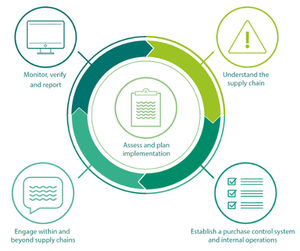Designed to help you reach your Deforestation and Conversion Free Goals
Supporting companies and financial institutions in implementing Deforestation and Conversion Free (DCF) practices

The DCF Implementation Toolkit is designed to assist companies in fulfilling their DCF commitments and aiding financial institutions in mobilizing their investees and clients. The Toolkit has been implemented by over 60 global companies and has received endorsement from global investors. It involves a comprehensive assessment of a company's practices, recommendations for improvement, and a DCF Implementation Plan template with annual milestones to facilitate the definition and achievement of commitments. Additionally, financial institutions can utilize the Toolkit's findings to engage with companies and monitor portfolio progress.
The Toolkit, which has been customized for supply chain actors in the beef, soy, and leather sectors operating in South America, has been developed by WWF and Rever Consulting with the support of over 20 sector specialists and is sponsored by the Gordon and Betty Moore Foundation under the Conservation and Markets Initiative. The Toolkit is in public domain and free for download and use. It is based on the Accountability Framework (AFi) and aims to help companies and financial institutions, of different engagement levels, to implement deforestation and conversion-free commitments, while also addresses related risks such as biodiversity loss, human rights violations, and greenhouse gas emissions.
A supply chain management approach is essential to tackle deforestation and conversion
All materials of the DCF Implementation Toolkit are structured according to the 5 elements of Supply Chain Management providing a holistic view of operations and improving decision-making processes.

Assess and Plan Implementation
The first element considers specific aspects of company’s commitment, existing Implementation Plan, and goals.
Understand the Supply Chain
The second element looks at the level of traceability to critical regions and risk assessment practices of suppliers.
Establish a purchase control and internal operations
This third element looks at the extent to which DCF commitments have been incorporated into the company’s operations, including supplier requirements, internal capacity building, and incorporating commitments into systems and structures.
Engage within and beyond supply chains
The fourth element evaluates efforts to build awareness among suppliers of DCF requirements, to provide capacity building programs and to collaborate with other actors on solutions to key challenges.
Monitor, verify and report
The fifth element, Monitor, verify and report (MRV), assesses practices regarding monitoring the execution of commitments with suppliers and reporting achievements internally and externally.
Deforestation and Conversion Free (DCF) Commodities Are Critical for a 1.5 °C Pathway

The climate target to limit global warming to 1.5ºC cannot be met without action from the food, land, and financial sectors. Net emissions from agriculturally driven land-use change (LUC) includes conversion or degradation of forests, peatlands, coastal areas, grasslands, croplands, and pastures. At an alarming rate, we have lost entire habitats including rainforests and grasslands. The deforestation and conversion of natural ecosystems drives biodiversity loss, disrupts freshwater cycles, erodes soils, and drives climate change.
The production of beef and soy commodities make up two of the leading drivers of ecosystem loss and is mainly responsible for agricultural land-conversion emissions.
Land conversion for cattle is responsible for 17 to 34% of food system LUC emissions (4 to 9% of total food systems emissions)
Land conversion for soy is responsible for about 8% of food system LUC emissions (~2% of total food system emissions).

The food system needs to decline by about 80% by 2050 to achieve the 1.5-degree target. This 80% absolute decrease in emissions includes the elimination of commodity driven deforestation.
Over the last decade, many companies across food supply chains have made commitments to halt deforestation. More recently, they have made commitments to address climate change and reduce their emissions. However, it’s one thing to commit, it’s another to act.
There are simple and practical steps companies, financial institutions and investors can follow to achieve this supply chain transformation and Deforestation and Conversion Free (DCF) commitments:
Assess current exposure to deforestation and conversion of all operations.
Establish a plan to eliminate all deforestation and conversion from supply chains.
The DCF Implementation Toolkit can support your organization moving forward to improving and implementing deforestation and conversion free commitments among your supply chain, lenders, or investees.
:blur(10)/)


